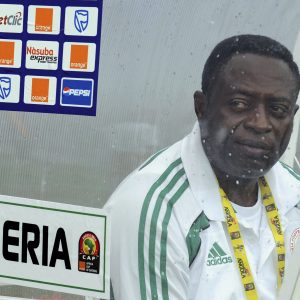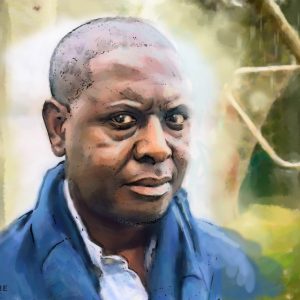Ndubuisi Egbo’s struggles and triumph in Albania
The Nigerian coach gave KF Tirana their first league title in a decade, moving the club from being a yo-yo team to returning where they belong. But not all of Albania has been kind to him.
Author:
12 September 2020

When a fallen giant of Albanian football needed resuscitating, they sent out an SOS call to a familiar face to breathe life back into struggling KF Tirana. Seven months later, Ndubuisi Egbo returned the club to where it belongs and in the process became the first African coach to win a European league title.
“This is the biggest club in the country, and there is a lot of pressure from the fans, from the club and everyone around,” the Nigerian told New Frame. “It’s a team that, if they go to an away game and draw, it’s like a loss to them, so you can imagine the kind of pressure that [managing] the team has. So it needs people with a strong mentality; you need to be prepared, you need to be ready and during those times I was asked to take over, I believe I was not ready for that task.”
Under Egbo, who had held the coaching job on an interim basis many times before and had previously turned down occupying it on a full-time basis, Tirana won the Kategoria Superiore for a record 25th time. This particular title was significant for a number of reasons, including that it came after they were relegated for the first time in the 2016/17 season.
Related article:
The decline from league stalwart to yo-yo club, predictably, did not sit well with the club’s administrative hierarchy, and led to much instability in the club’s coaching ranks. With the club in yet another slump and only one place above the relegation zone midway through the 2019/20 season, Tirana turned to Egbo – a former Nigeria international who first came into prominence in Enugu with NITEL Vasco da Gama. He then starred for two of the premier teams in Lagos in NEPA and Julius Berger, before moving to Egypt to join Al-Masry.
There, he spent three years, picking up Arabic to better integrate, and helping the club win the FA Cup in 1998. His performances were strong enough that he featured in the national team picture. He was part of Nigeria’s squad to consecutive Africa Nations Cups in 2000 and 2002, but on both occasions was behind in the pecking order to the more experienced Ike Shorunmu, who had enjoyed a more storied career in Switzerland and Turkey.
Eager to also move to Europe, Egbo decided on a transfer to Albania with KF Tirana, which he hoped would prove a stepping stone to one of the major European leagues. Instead, he found that he was “impressed” by Albania, and decided to make a home in the country. Following the end of his playing career, he studied for his coaching badges and, in 2014, attained Albanian citizenship.
A born winner
In 2014, Egbo returned to Tirana as goalkeeping coach and assistant manager. However, this was a different club to the one in which he had played; a historic club had fallen on hard times, and by that point had not won the title for five years.
In December 2019, the 47-year-old was handed yet another salvage mission, this time on a three-game basis. His first assignment: only the country’s biggest derby, against city rivals FK Partizani, a proposition that had become distinctly unpalatable in recent years. For KF Tirana’s previous victory in this fixture, one needed to go back six years. It was a daunting task by any standard, but even more so for a side that was four games without a win and low on confidence.
Related article:
Remarkably, Egbo’s side came through that examination with flying colours, snatching a 2-1 victory through Ghanaian midfielder Winful Cobbinah’s strike in stoppage time. It served for an emotional high, but was also a turning point. “It was a massive win for us as my first game,” Egbo says. “Since then, everything started going forward.”
Two more wins followed in nine days, and KF Tirana went into the winter break on surer footing. Egbo, who could have been reasonably satisfied he had carried out the mandate required of him, would however learn the club wanted more. Once again, he was asked to take the reins on a permanent basis.
This time, after an initial period of hesitation, he accepted. “When I consulted my advisers, my spiritual director, supporters and my family, I was told to take it because they felt that I was ready. I listened to their advice, and also to my sporting director who had confidence in me, and to my president.”
As it turns out, his advisers were spot-on in their evaluation. Crucial to this sudden turnaround was, among other things, Egbo’s fierce winning mentality, one which he says runs through everything he does and is expected of a player donning Tirana’s colours.

“Any coach needs to have his own philosophy that he puts into his players. I’m a winner. I always want to win, even if I’m playing a friendly game, or playing with my friends. Even if I’m playing cards, I want to win always. That’s the type of mentality I try to put into my players.
“This was the mentality the team had when I played here. We had players that wanted to win, achieve all the time. When I was playing, if you came to a training session, it was like a (competitive) match. The fans would come to watch.”
The unavoidable spectre of racism
Egbo says he has been overwhelmed by the goodwill he has received since leading Tirana to their first league title in a decade, and doing so in the club’s centenary year.
“From that day till now I’ve been receiving greetings from all over the world, from different parts: my country, Africa, Europe and everywhere. I was just focused on winning the championship with my team after 11 years staying out. Focusing on winning it especially in the centenary celebration of the club – this is the 100th year of the club’s formation, and it’s a wonderful feeling that we succeeded in winning the championship for the club so that all the names of the players will be written in gold forever in the history of the club. I didn’t imagine it was a massive, huge achievement until I was made to know I am the first African to accomplish this kind of feat.”
Of course, the exceptional nature of his success shines a light on one of the more germane issues in the world today: racism.
Related article:
Even though Egbo has described Albania as a “second home”, and even previously dated an Albanian before getting married to his wife, who is from the Philippines, he admits racism remains a “big problem” that manifests itself both openly and covertly. Despite his efforts at assimilation – he speaks Albanian fluently – he finds the spectre of discrimination impossible to escape.
“When you start talking about your experiences of racism, then they start to say you’re trying to play the race card. The truth has to be said, so everyone knows what is going on.
“I have encountered it on many occasions, both in the streets and on social media. People have thrown bananas at me, spat at me during matches. On a bus one time, some people were whispering behind me that I could be a terrorist. They were surprised when I replied to them in the language.”
Still, Egbo remains upbeat, determined to turn that negativity into triumph.
“The experiences I’ve had didn’t bring me down. Rather, it was a motivating factor, and helped me to say, ‘If they’re doing this to you, they’re trying to bring you down, that means you have something in you they’re trying to kill. That means you need to work harder to bring it out.’ That is exactly what I did. It’s not like Albanians are more racist than in other countries. Every country has racism.”
Egbo’s success has been feted by the country’s media for the most part.
Related article:
“Here, the journalists are divided between the fans: most of them are KF Tirana fans,” he laughs. “They have been celebrating, joyful that we succeeded in winning the league for a long time, because all of them were supporting us when they saw we were on the verge of winning the championship.
“We’ve set many records in the league this season that Albanians are still… They were not getting it, but it’s sinking in when I try to explain to them. Until now, some of them are still asking me ‘What did you do to achieve this, to make these players win 17 games unbeaten? No coach has done it in the 40-year history of Albanian football!’”
There is a sense that history is being enacted, and Egbo is breaking down barriers in ways many previously thought impossible. As news of his success spreads across Nigeria, there has understandably been talk of him coaching the national team at some point. Would he be open to that, seeing as he “thinks in Albanian” (his own words) and sings the Albanian anthem?
“For me, like I’ve said many times, it’s my country. I can be a European through citizenship, but I am 100% African, and any time I’m called upon, if there’s any space, to come and serve my fatherland, of course I’m open to do that.”
Success as a catalyst for change
For Egbo, his success is very much a rejoinder to those who seek to belittle black coaches. He calls out African football associations on the ‘white is right’ ideology, and challenges them to put some stock in their own.

“This isn’t (just) a victory for me, but an achievement for all African coaches, all black coaches that have been complaining that they’ve not been given a lot of exposure or opportunities like they give to their white folks.
“I believe this will be an eye-opener to my own black race; we should not underrate ourselves. In many aspects, we have cultivated the idea that Europeans are better. I believe this success will go a long way toward changing that mindset from my African brothers.”




